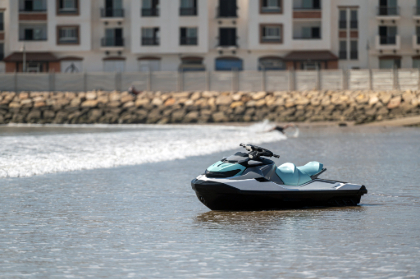INDEPENDENT DEALER
DFW area | (817) 821-2533
OUR BLOG
To have a fun and enjoyable time out on the water your marine engine needs to work perfectly. This post by DFW Distributor in DFW Area will share the top signs your personal watercraft needs service that you should look out for.

Owning a personal watercraft (PWC), whether it’s a Jet Ski, Sea-Doo, or WaveRunner, means you get to enjoy thrilling rides, cool ocean spray, and plenty of summer fun. But just like any motorized vehicle, PWCs require regular upkeep to keep running smoothly. When something feels off, don’t ignore it. Catching issues early can prevent bigger (and more expensive) problems later.
Here are seven warning signs your personal watercraft needs service, especially if you want to keep enjoying safe, worry-free rides.
Hit the waves safely! Call DFW Distributor in DFW Area at (817) 821-2533 or visit AMSOIL's online store for help maintaining your personal watercraft.
Signs Your Personal Watercraft Needs Service
1. Sluggish Acceleration or Reduced Speed
If your PWC isn’t launching with the power it used to or feels bogged down when you throttle up, something’s not right. Slow acceleration or reduced top speed often point to:
- Fouled spark plugs
- Clogged fuel injectors
- Dirty air filters
- Impeller or wear ring damage
- Water in the fuel
While some issues are minor and can be resolved quickly, others, like damage to the impeller or jet pump, require professional inspection. If your machine doesn’t feel “zippy” anymore, don’t wait until it won’t move at all.
2. Unusual Noises or Vibrations
PWCs naturally create some vibration, but you’ll know when something feels off. Grinding, rattling, buzzing, or loud clunking noises are not normal. These sounds may indicate:
- Foreign objects in the intake grate
- Loose engine mounts
- A worn or damaged impeller
- Jet pump misalignment
Ignoring these vibrations could lead to serious drive system damage. If your ride feels rougher than usual, it’s time to get it checked.
3. Difficulty Starting or Frequent Stalling
A healthy PWC should start quickly and idle reliably. If your machine is hard to start, cranks excessively, or stalls during low-speed operation, you could be dealing with:
- A weak battery
- Ignition coil issues
- Carburetor or fuel injector problems
- Dirty fuel
Sometimes, moisture buildup or corrosion in the electrical system causes intermittent starts or engine shutdowns. Either way, don’t risk being stranded on the water. Get it serviced.
4. Overheating Engine
PWCs rely on the surrounding water to cool their engines. When something goes wrong in the cooling system, your engine can overheat quickly. Common causes include:
- Clogged cooling lines or intake
- Malfunctioning thermostat
- Broken impeller
- Debris in the jet pump
If you notice high engine temps, warning beeps, or hot air coming from the exhaust, shut off your PWC and seek professional help. Continuous overheating can lead to cracked engine blocks and total failure.
5. Dashboard Warning Lights or Error Codes
Many modern PWCs feature onboard diagnostics. If your dash is displaying a warning light or flashing an error code, take it seriously. These indicators might signal:
- Low oil pressure
- Engine overheating
- Sensor malfunctions
- Electrical or fuel system issues
Don’t just clear the code and keep riding. It’s your machine’s way of asking for help.
If your PWC needs new oil, check out AMSOIL’s full-line of Marine Engine maintenance products to keep a strong and healthy engine.
6. Smoke or Strong Odors
Thick smoke from the exhaust is never a good sign. It may point to:
- Burning oil (especially on 2-stroke engines)
- Water in the cylinders
- Fuel system issues
Similarly, a strong fuel smell could indicate a leak or flooded engine, while a burning rubber odor might mean belts or hoses are failing. In any of these cases, it’s best to stop riding and have a technician assess the damage.
7. Leaks or Water in the Hull
Your PWC’s hull should remain dry during operation. If you notice:
- Water pooling in the bilge or engine compartment
- Fuel or oil leaks
- Corrosion or rust near fittings or seals
…it’s time to act. Leaks can compromise buoyancy, damage electronics, or even lead to sinking. Check the hull interior regularly and have any leaks sealed immediately.
Why Preventive Maintenance Matters
A well-maintained PWC lasts longer, performs better, and reduces your risk of injury or breakdown. Certified technicians can:
- Replace spark plugs and fluids
- Inspect impellers, jet pumps, and wear rings
- Test electrical systems and battery health
- Clean fuel systems and filters
- Check the cooling system for blockages
Seasonal maintenance, especially before and after winter storage, is essential.
Bonus Tips to Prevent Service Issues
- Flush the engine with fresh water after every ride, especially after saltwater use.
- Use ethanol-free fuel when possible to reduce corrosion and clogging.
- Store your PWC properly in the off-season to prevent freeze damage.
- Inspect the intake grate regularly for debris.
- Keep your battery charged when not in use.